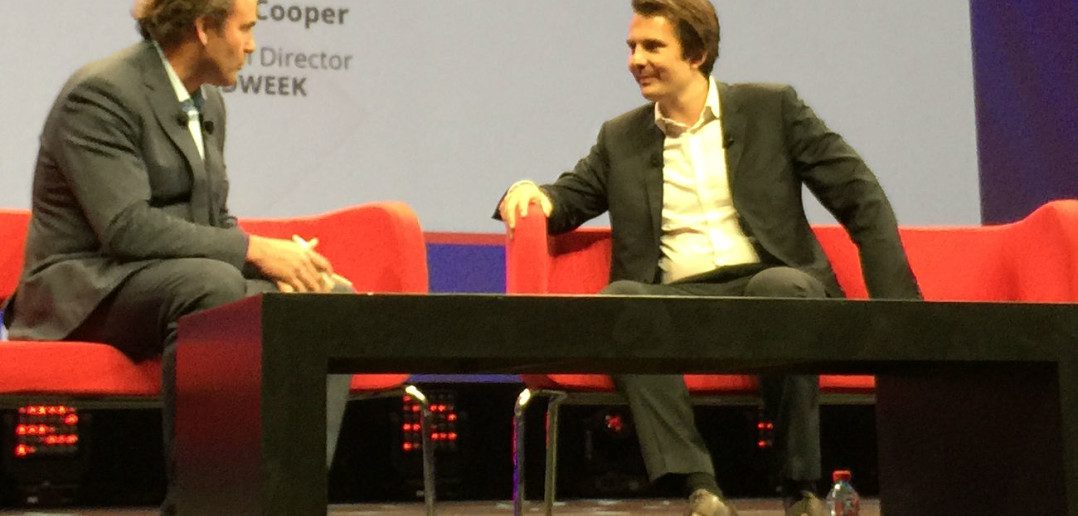Yannick Bolloré is chairman and chief executive of advertising industry giant Havas, and took to the MIPTV Grand Audi stage this afternoon for a Media Mastermind keynote interview outlining his views on digital disruption, mobile-first strategies and how his company might be able to help the music industry with its monetisation problems. Bolloré was interviewed by James Cooper, editorial director of AdWeek.
“In 10 years, the world of content: TV / advertising has been completely disrupted. I think there has been a double big disruption. Firstly a disruption of all the distribution platforms… at the same time the way we produce content is changing. We all have smartphones, digital cameras, so it is very easy to produce content, and sometimes content of good quality.”
Bolloré said that the world we used to know “where we knew more or less all the content” does not exist any more. “10 years ago it was possible to see everything… We have shifted to a wall of infinity. It is impossible today to have this erudition about the content… And it is clearly a fascinating disruption.”
How is Havas positioning itself amid all this? He said it still has a role to play due to two challenges. First: “how to put the consumer at the heart, at the core”. With big data playing an increasingly vital role. “Imagine we can address the right type of content to the right type of person on the right device at the right time of day: it will become much more meaningful.” He thinks this will dramatically change the way content is distributed.
How are Havas’ clients catching up with this, and how does the company persuade them to experiment? “I would say that our clients are very joyous: they want to be the first to test new opportunities,” he said. “Brands are trying to invest in new territories of expression. They want to invest more in what we call brand content to see how they can address consumers in a different way.”
He talked about a Just Dance Now game by Ubisoft that has been downloaded 10.7m times as an example of this, with Coca-Cola’s branded song played 4m times within the game. “Coke maybe more than anyone understands that they need to engage their consumers, and with this type of activation, it’s a completely different way to express itself as a brand… And the engagement: you have seen the numbers, they’re huge!”
Does Havas spend more time thinking about data or mobile? “Data is of course key, but… in fact the question is how do you shift from this big data to smart data, which can give meaningful insights to the brands and companies?” he said. “Mobile I would say, if you try to oppose mobile and desktop, it’s no longer true. We now natively don’t think about desktop. We are creating websites, apps for mobile, and we migrate to desktop. It’s no longer the other way around: today, it is clearly a mobile-first environment.”
He talked about consolidation as an opportunity rather than a threat, at a time of rumoured (and attempted) mega-mergers in the advertising industry. “We decided to use our agility and ability to adapt more quickly than the others,” he said. “We have changed in six months dramatically the organisation… It does allow us to ask ourselves the right questions, to adapt quicker than if nothing would have happened. And now we come out stronger from this event than we entered it.”
Bolloré also talked about Havas’ moves to consolidate its various digital agencies, which he admitted hadn’t always been a smooth process. “Advertising is like villages: you have a lot of different villages competing with each other, they don’t like each other, they have a lot of ego! And with digital there is a lot of, not blurred lines, but clear overlap between these groups of people,” he said.
“I decided to gather everyone into the same big village so we can foster collaboration… The first meeting was like a Game of Thrones meeting: you had to leave your weapons at the door! We started like that, but after a period of time we have managed to create something unique… And it has been one of the few reasons that is explaining our success today.”
Bolloré talked about the “translator” aspect to Havas’ creative business, starting from what the brand would like, and figuring out how to translate that into effective content. Havas has started its own production arm to make branded content, gathering people from advertising and people from the traditional content industry. “This is not an agency, this is not a production company: it is clearly a mix. We call it a production agency,” he said.
What will be the most important hire that Havas will make in 2015? “Sorry to state the obvious, but every hire is important. In advertising, the only asset we have is talent. We don’t have any recurrent TV series or formats. We are just selling brainpower from our people to advise our clients,” he said.
Bolloré was asked about Havas’ approach to innovative new technology apps and platforms: does it jump on things like livestreaming apps Meerkat and Periscope early or bide its time? “It’s very important for a group like ours that we remain very forward-thinking. We need to embrace innovation… it is very important to have people whose jobs consist in trying to discover new tech platforms in order to be the first to introduce them to our clients,” he said.
What about interesting markets? “Korea is an interesting market, for this is by far the most advanced country in broadband, and they were the first to have 5G. It’s not mobile-first in Korea, it’s mobile-only,” he said.
Is there an industry buzzword that he’s completely bored by? “Many, I’m not sure I’ll have enough time [to list them]! Data, content, digital, 360. All those words that in fact mean so many things that in fact it doesn’t mean anything,” he said. “We have to prioritise what type of data, what type of content we talk of.”
Bolloré was asked about Havas’ relationship with another media giant, Vivendi. “I like to say the two companies have a standalone strategy, which is very successful in both cases. We are of course the advertising agency of Canal+ so it’s very close links… and we have launched a very nice approach about data,” said Bolloré, referring to Havas’ partnership with Vivendi subsidiary Universal Music Group, which revolves around data analysis.
“The music industry is going through a problem of monetisation: they have a problem to sell physical discs any more and to get the same kind of money they had in the past. And in the meantime their artists are becoming superstars on social media: Rihanna, Ariana Grande, Justin Bieber… they have millions and millions of followers. They have become even more powerful than the media itself,” he said.
“If we can help them, with our mathematicians and algorithms, to collect the data properly and optimise it, I am sure we can be a source of monetisation for the music industry. We are trying to help, as we are with all our different clients.”
Check out MIPTV, MIP Digital Fronts, MIPDoc & MIPFormats 2015 full live coverage




